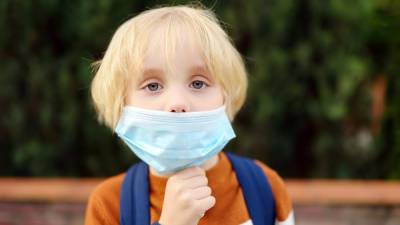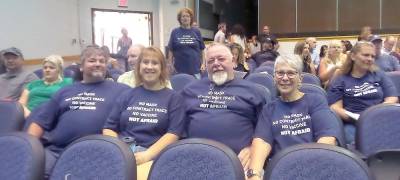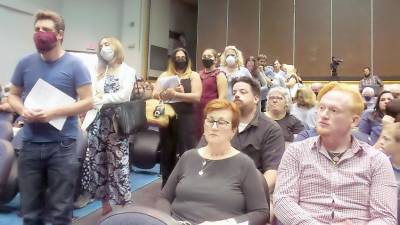A tale of two school districts in the time of Covid-19
Milford. Even after factoring in the population difference, Wallenpaupack still had 35 percent fewer cases in January, when the Omicron wave hit, than Delaware Valley. Did mask-wearing and community cooperation play a role?

No two school districts have managed Covid-19 in exactly the same way. As the pandemic enters its third year, two local districts are looking back on very different Januarys, when the Omicron wave peaked.
As of Jan. 28, the Wallenpaupack Area school district reported 119 students testing positive that month. Twenty miles away, the Delaware Valley school district, which is twice as big as Wallenpaupack, reported 320 cases as of Jan. 28. But even after factoring in the population difference, DV still had 35 percent more cases in January.
The two schools have managed the pandemic differently, especially with regard to masks, about which there is much debate. Do they really work to slow transmission of the virus? Do they do more harm than good, when students and teachers cannot see one another’s expressions?
Wallenpaupack has enforced the state’s mask mandate throughout the pandemic and up to the present day. Last fall, amid contentious meetings on the subject, the Delaware Valley school board agreed to allow parents to opt their children out of mask wearing. By most reports, most students continued to wear them after that, although it would be difficult to discover the true rate of mask wearing at DV.
In late December, state Supreme Court threw out Gov. Wolf administration’s statewide mandate that face coverings be worn inside K-12 school buildings. Even so, Wallenpaupack continues to require masks.
The view from Wallenpaupack
The Wallenpaupack Area School District’s (WASD) Superintendent Keith Gunuskey told the Courier that his district has worn masks since the first day of school.
“Our mantra throughout the pandemic has been ‘Keep schools open and safe.’ Everyone tends to agree with keeping schools open, yet defining how we keep schools safe tends to generate the most discussion.”
It’s a multi-faceted problem, he said: “The adage of ‘there is no simple answer’ has never been so true.”
“WASD has relied heavily on the guidance of our health care professionals,” said Gunuskey, referring to the U.S. Centers for Disease Control, the Pennsylvania Department of Health, the APA, and local health care providers. “Their guidance helped us to sift through the complexity of the safety issues and create a health and safety plan that reflected sound medical advice, along with a general caring and compassion for our students and staff.”
He said this approach had many positive outcomes. “We have not had to close any of our schools for one single day,” he said. “Our continuity of education is intact. We have had after-school programs, sporting events (with fans this year!), plays, concerts, and community activities. Our seniors have been able to experience all there is that goes along with their final year in high school.”
In January the school had a total of 119 districtwide positive cases reported, Gunuskey said. “January 8 to 14 seemed to be our peak, with 44 cases reported,” he said. “We have started to see a decline ever since.”
Wallenpaupack is also participating in a test2stay program, and have been doing so for about four weeks. “We recognize the benefits of keeping students in school and the challenges of multiple quarantines,” Gunuskey said. “Test2stay allows our district to move away from quarantine in a sensible and safe manner.”
Students are tested twice, once between days two and four of their exposure and once between days five and seven. The test takes 10 minutes and is free. Students remain in school, where they would have otherwise been quarantined. “Test to stay is an optional program that ensures that ill students and staff stay home, and healthy students and staff remain in school,” Gunusky said.
Wallenpaupack does not require its students or staff to be vaccinated. “We have offered multiple vaccine/booster clinics for our students and staff,” Gunusky said.
Wallenpaupack had a few school bus and van drivers come down with Covid, or identified as close contacts. “Fortunately, we had previously worked out a schedule of buses/vans that could complete a second run,” he said. “This was only needed a handful of times with no significant interruptions.”
Throughout the time that masking has been mandated, Gunusky said, “our plan has been such that everyone who enters the building must be masked. Individuals who chose not to mask were sent home. Thankfully, we had very few circumstances that required individuals to be sent home for refusing to wear a mask.”
Wallenpaupack has received pushback. “Yes, we have had many parents voice their concerns about masking,” said Gunusky. “These concerns have been presented at school board meetings, and through emails. I think it is also important to know that we have had many parents voice their opinion in favor of masking. Overall, I believe most of our parents and students want schools to be open and safe, and they recognize that not following mitigation efforts (masking, quarantining, social distancing, etc.) may lead to schools being closed, activities being cancelled, or some other type of disruption to the educational day.”
The view from Delaware Valley
Conflict has defined the school year at Delaware Valley. The year has seen a string of rowdy meetings, challengers running for school board, a court injunction, two lawsuits, and a fatal Covid outbreak sidelined 17 bus drivers and shut down classrooms.
Mostly, members of the school community have been fiercely divided on whether students should adhere to the state mandate, ordered in September, requiring the wearing of masks inside school buildings.
Last November, a slate of candidates supporting science-backed Covid safety measures challenged the incumbents on the school board. A record turnout saw the safety candidates get about as many votes as victorious DV candidates usually get — but the incumbents received an order of magnitude more votes than that.
Also last fall, five Delaware Valley parents sued for a court injunction after the school board decided that a waiver attesting to a medical reason why a student could not wear a mask could be signed by the student’s parent, and not a medical professional. The parents suing for the injunction said the school did not protect their children with special needs, who are more vulnerable to Covid-19.
A federal judge at first sided with the parents, issuing a temporary injunction, and a few weeks later with the school board. He said the secretary of health did not actually specify that waivers needed to be signed by a medical professional, only that they needed to be truthful. He also said the school was still obliged to protect the children while under its care, including from Covid.
The five parents filed a brief last month saying the students represented in the lawsuit did suffer actual harm, contrary to what a federal judge had earlier decided. It asks the judge to consider additional information provided after their original complaint was filed in October. The children are represented by their parents, who appear as five “Jane Does” in court documents to protect against community backlash.
Two of the children were exposed to Covid-19 after the court lifted its temporary injunction, according to the brief. In the resulting quarantine in two separate households, each exposed child had to be separated from their families, which, the brief argues, violates the families’ Constitutionally protected right to freedom of association. Breaking up families supports the “state-created danger claim” denied in the earlier ruling, according to the brief.
Some are frustrated with what they see as DV’s continued resistance to Covid safety measures.
After the last board meeting on Jan. 20, the teachers’ union president, Kayla Troast, and one parent who said she wanted to remain anonymous for her own safety, told the Courier that school officials went through each school and took down all the signs referencing masking and social distancing.
“We have not had to close any of our schools for one single day. Our continuity of education is intact. We have had after-school programs, sporting events (with fans this year!), plays, concerts, and community activities. Our seniors have been able to experience all there is that goes along with their final year in high school.” Wallenpaupack Superintendent Keith Gunuskey




